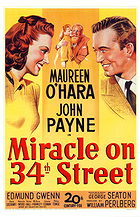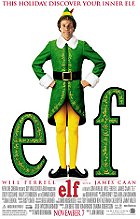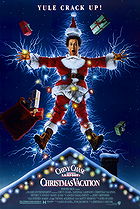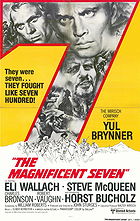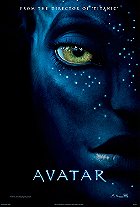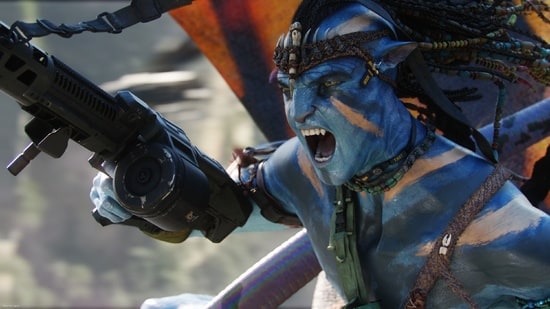As the title implies, writer-director Richard Curtis's Love Actually is a motion picture about love. Without any cynicism or pessimism, this is an unashamedly upbeat romantic comedy - it proclaims that, even in the direst of circumstances, love is all around, and if we cannot see it, it is because we are not looking. This sentiment constitutes the film's core, and though it may seem cloying or mushy, Curtis is so earnest in upholding the notion that it comes across as genuinely touching. Like most films featuring a sizeable ensemble cast, Love Actually is overstuffed, but it leaves you wanting more due to the feature's pervasive charm, enchanting characters and sharp, witty writing. Curtis's directorial debut after scripting numerous acclaimed comedies, Love Actually is an endearing cinematic exploration of the most essential human emotion that will leave you feeling warm and fuzzy. Containing a cast of more than twenty main characters in separate yet intertwining stories, Love Actually is a Robert Altman film on antidepressants and Viagra.

Love Actually plays out as a string of short vignettes that follow a group of semi-linked Londoners during the lead-up to Christmas. These stories are about love in all of its multiple forms and guises: love between siblings, love between parents and children, love between spouses, puppy love, platonic love, unrequited love, and sexual/romantic love. Characters are falling in love, and other characters fall out of love. Some characters are with the right people, and some are with the wrong people. Some are looking to have an affair, while others are in a period of mourning. One character also needs to come to terms with having feelings for a member of the same sex.
One of the key narrative threads involves the new Prime Minister, David (Hugh Grant), who cannot express his feelings for his new personal assistant, Natalie (Martine McCutcheon). Additionally, there is an art gallery manager (The Walking Dead's Andrew Lincoln) who's in love with his best friend's (Chiwetel Ejiofor) new wife (Keira Knightley), a pair of naked movie stand-ins (Martin Freeman and Joanna Page) who grow closer while performing simulated sex scenes, a writer (Colin Firth) who falls in love with his Portuguese housekeeper (Lúcia Moniz) despite her not speaking English, and a burnt-out rock star, Billy Mack (Bill Nighy), who releases a new single entitled Christmas Is All Around. Another vital story involves Daniel (Liam Neeson), who struggles to deal with losing his beloved wife while caring for his stepson, Sam (Thomas Brodie-Sangster). Sam develops a crush on his American classmate, Joanna (Olivia Olson), but does not know how to approach the situation. More stories occur within, including a design agency director (Alan Rickman) who begins pursuing an affair with his secretary (Heike Makatsch), as well as a designer in the same company (Laura Linney) falling in love with the creative director (Rodrigo Santoro).
To illustrate the film's core message about love being everywhere, Curtis opens and closes the film at Heathrow Airport, making use of authentic footage of the arrival gates full of anonymous smiles, hugs and kisses. After all, what is more symbolic than the longstanding rom-com cliché of the airport? Love Actually sees Richard Curtis take the helm of a production after over two decades of film and television writing. After contributing to iconic TV shows like Blackadder, Mr. Bean and The Vicar of Dibley, he scripted such acclaimed movies as Four Weddings and a Funeral, Notting Hill and Bridget Jones's Diary. Curtis is, therefore, able to confidently temper romanticism with comedy. Love Actually is frequently hilarious, containing numerous side-splitting comedic set pieces. Most memorably, there's a hilarious scene featuring Rowan Atkinson as a department store attendant. The film also heavily features Billy Mack, the outspoken, addled rock star whose tendency to proclaim his new single is commercial shit exasperates his long-suffering manager (Gregor Fisher).
The only problem with Love Actually is that there is too much here, with all the tales feeling slightly underdone. The stories are easy to follow and enjoy, but it is challenging to genuinely care about all the characters, as each segment receives an average of eight minutes of screen time. The film's original cut was significantly longer, even incorporating an additional storyline, but Curtis and editor Nick Moore (Notting Hill, About a Boy) ultimately hewed the picture down to a bit over two hours. Remarkably, however, the film nevertheless works, with Curtis finding a strong narrative rhythm, and it is fun to see what amounts to a reel of highlights for nearly a dozen separate romantic comedies without losing any narrative coherence. Additionally, Curtis resolves some stories in a downtrodden manner, while other endings feel like fantasies. Although it feels like Curtis keeps changing the rules, the variety keeps the film more surprising and enjoyable.
For all intents and purposes, Love Actually probably should not work because it has too many characters and stories. Despite this, it does work to a remarkable degree, dissecting love, lust and loss with charming precision while delivering humour and poignancy. Although there is an overabundance of characters, every one of them is worth spending time with, and I would be willing to sit through another two hours of them fumbling their way through the messy odyssey of falling in love, staying in love, or loving people they cannot be with. When the end credits roll, it is virtually impossible not to smile or feel heart-warmed. Plus, if the biggest complaint about a motion picture is that there is not enough of it, that is undoubtedly indicative of a disarming, joyous film. Curtis later wrote and directed a mini-sequel in the form of 2017's Red Nose Day Actually, a 17-minute promotional short film that checks back in with several of the characters.
One of Love Actually's biggest pleasures is the ensemble cast comprising numerous respected and recognisable British actors. Hugh Grant, Liam Neeson, Colin Firth, Emma Thompson, Alan Rickman, Keira Knightley, Kris Marshall, Martin Freeman, Bill Nighy and the aforementioned Rowan Atkinson are present here, to name a few. Neeson is boundlessly likeable as the struggling widower, while Grant is his usual charismatic self as the Prime Minister, reminding us why he is a popular and reliable choice for romantic leads. Other nationalities also pop in, with Laura Linney meaningfully contributing to the story, while Billy Bob Thornton makes a memorable cameo appearance as the President of the United States, reportedly taking a break from Bad Santa to film his scenes. To wax enthusiastically about the cast would take days, but suffice it to say, this is a fantastic ensemble full of compelling and amusing performances. Every actor manages to shape distinct characters with clear-cut personalities, staving off story or character confusion. However, Billy Nighy arguably trumps the rest of the cast, delivering a show-stealing performance as Billy Mack. Nighy is a hoot, wholly committing to the role with his singing and comedic antics.
As a Christmas love story, Love Actually is romantic, festive and jubilant enough to become a Yuletide mainstay, making it unsurprising that it has become a holiday tradition in many households. Cinematographer Michael Coulter beautifully captures the London setting with its festive decorations, and the soundtrack is pitch-perfect, with delightful Christmas tunes and a fantastic original orchestral score by Craig Armstrong. Online critics continue to debate the morals of various stories, with Keira Knightley herself even proclaiming the cue card scene as creepy, but it seems Scrooge-like to analyse the picture to such a degree when it is so effortlessly captivating. Love Actually is full of iconic scenes and moments, from David's dance scene to the school Christmas pageant and a last-minute dash to the airport. The movie is smart, funny, entertaining and poignant, sidestepping the usual genre pitfalls to weave a thoroughly enjoyable exploration of the human heart. This is a delightful way to spend two hours, and it is terrific to witness so many of Britain's best actors sharing screen space in their prime.
7.9/10
 Login
Login
 Home
Home 183 Lists
183 Lists 1671 Reviews
1671 Reviews Collections
Collections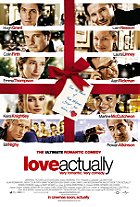



 0 comments,
0 comments, 
